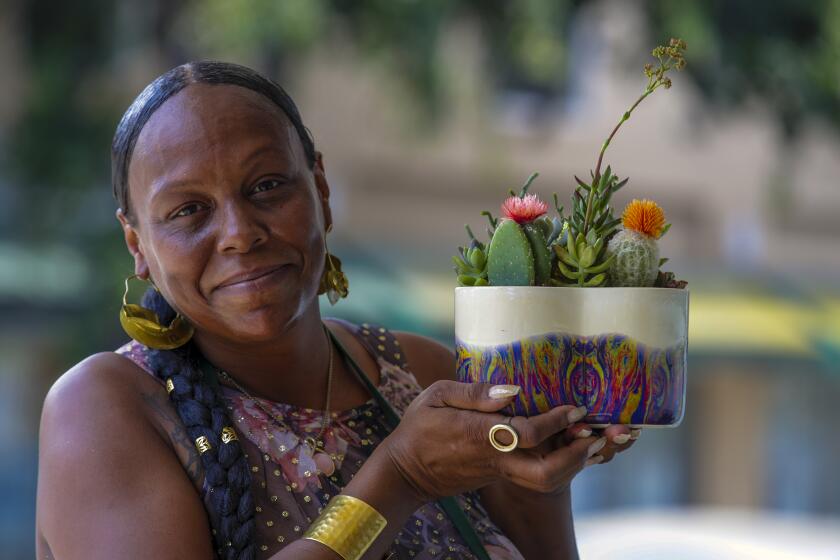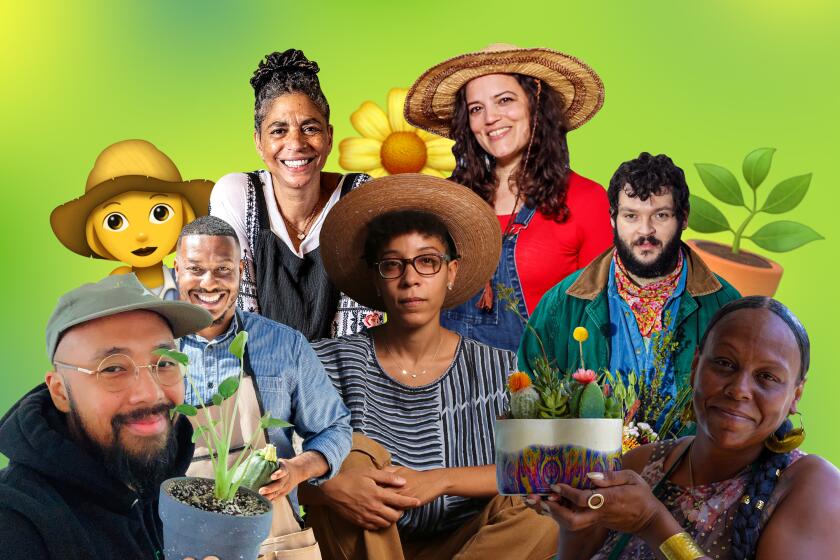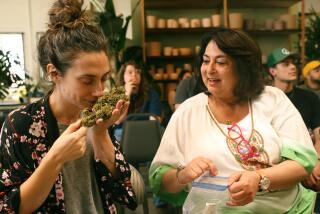More than plant care: L.A. plant shop offers plant parents ‘Self Care in a Box’
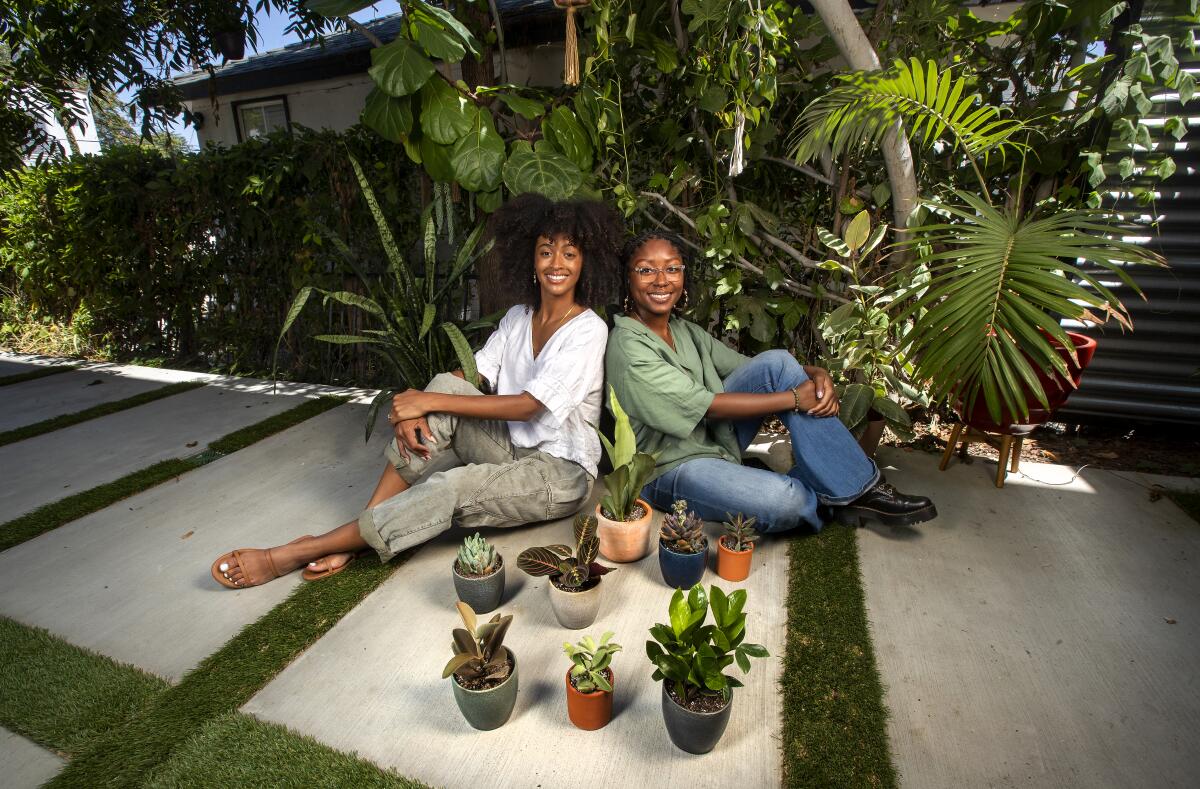
- Share via
This is the latest in a series we call Plant PPL, for which we interview people of color in the plant world. If you have any suggestions for PPL to include in our series, tag us on Instagram @latimesplants.
When you order a plant (or four!) straight to your doorstep from the Nice Plant, the box it arrives in — printed with the phrase “Self Care in a Box” in eye-catching, black block letters — tells you everything you need to know about the fast-growing, Black-owned, Los Angeles-based plant shop.
“In every box, we’re really encouraging and motivating people to create their own self-care routines,” said Jasmine Nicole, chief executive and co-founder of the Nice Plant. “You have your plant companies, and you have your wellness companies. We found a way to mesh it together.”
Nicole, a Cleveland native and creative producer, founded the Nice Plant in June 2020 with her longtime business partner Andre Cisco. The shop — which sells locally sourced, pre-potted cactuses, succulents, zebra haworthia plants and more along with plant-based products including an essential oils-based room spray and all-natural soy candles — exists primarily online, but the team has recently experimented with a handful of pop-up shop events and plans to open a physical storefront.
Most important, the Nice Plant is committed to the values of thoughtfulness, mindfulness and self-care. Every product it sells comes with a care card explaining how to best care for your new plant baby and for yourself.
For Nicole, self-care and plant care have always been intertwined. The 30-year-old said that taking time each day to check on her plants serves as an important reminder to slow down and check in with herself as well. However, she noticed that she rarely saw people who look like her depicted in self-care media.
“[With] everything from yogis to self-care, most of the time, young Black people [are] on the margins if not excluded altogether,” Nicole said. “That’s not reality for us. We care about the foods we eat; we care about the products we buy, the things we put in our homes. There are a lot of ways in which we’re mindful of what we’re consuming and practicing every day, so it was frustrating to never be at the center or be included in those messages and visuals.”
Nicole quickly realized that the plant shop she’d always dreamed of starting could help combat this lack of representation.
“We weren’t seeing ourselves. So with the Nice Plant, from our partners to our team to our suppliers, we’re very mindful of who we’re working with and the messages and the stories we’re trying to amplify,” she explained. “We want people to see Black and brown people with plants and their lifestyles. We want to show that self-care does not have a definition or a look.”
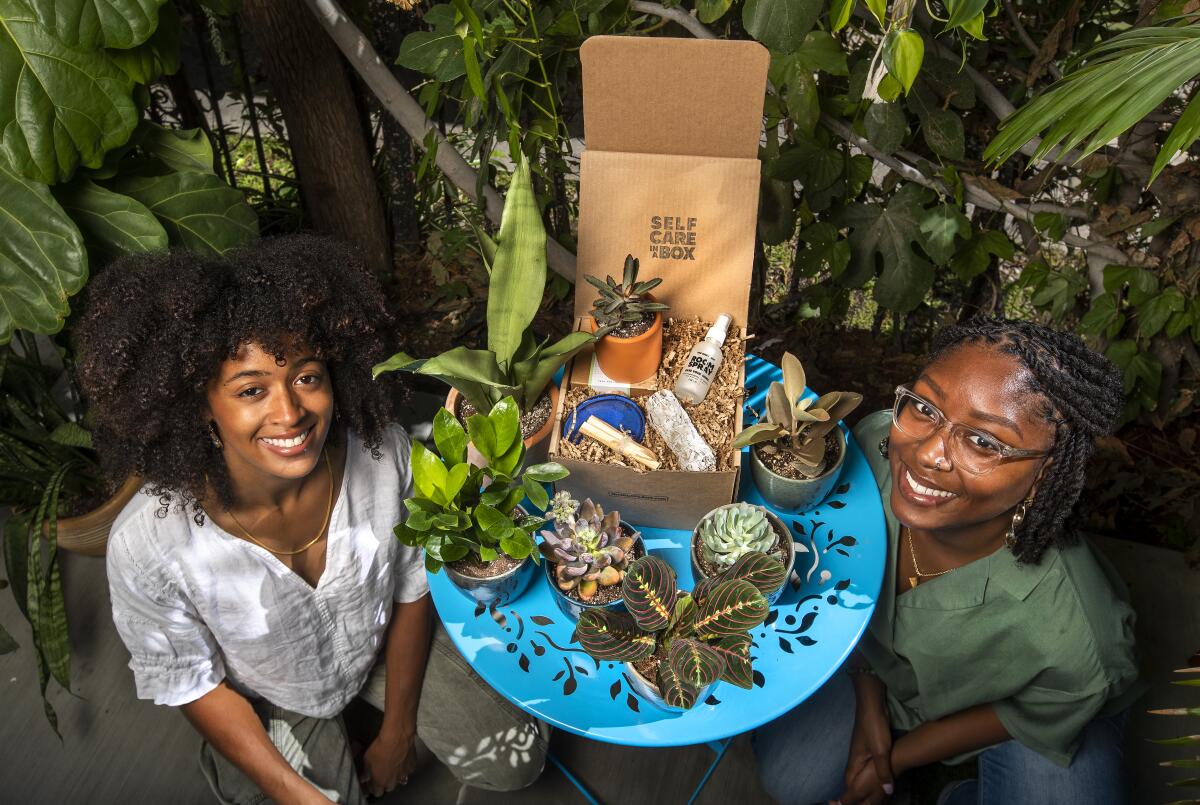
A second-generation horticulturalist, Nicole knew from a young age she wanted to open a plant shop. However, due to her busy schedule working with a multitude of clients and brands, she felt she would have to put off her dream for at least a few decades.
But the COVID-19 pandemic changed everything. Nicole’s once robust schedule ground to a halt.
“When the pandemic hit, it created space to brew around the idea of creating something new,” she recalled.
As the experienced brand-builder began brainstorming ideas for her next business, her fiancé urged her to focus her time and talents on something she is genuinely passionate about. That was easy; it had to be plants.
Meet La Nola Smith, founder of South Central Succs, a succulent arrangement business in L.A.’s Leimert Park Village that has become a community hub.
Once she settled on opening a plant shop, Nicole wasted no time building a small team that includes a greenhouse manager, an operations manager, interns and social media managers.
Taylor Hartfield, a 26-year-old from Toledo, Ohio, with a background in marketing and brand building, also joined the Nice Plant team. She discovered her passion for plant care during childhood while helping tend to her great-grandmother’s garden on the weekends.
Nicole met Hartfield five years ago after Hartfield applied multiple times to intern at the creative agency Nicole co-owns. She admired Hartfield’s determination, and the pair became fast friends.
“Before we even launched the Nice Plant, I knew I wanted Taylor to be involved,” Nicole recalled.
A marketing graduate from Bowling Green State University, Hartfield naturally slid into a social media marketing and event promotion role at the Nice Plant.
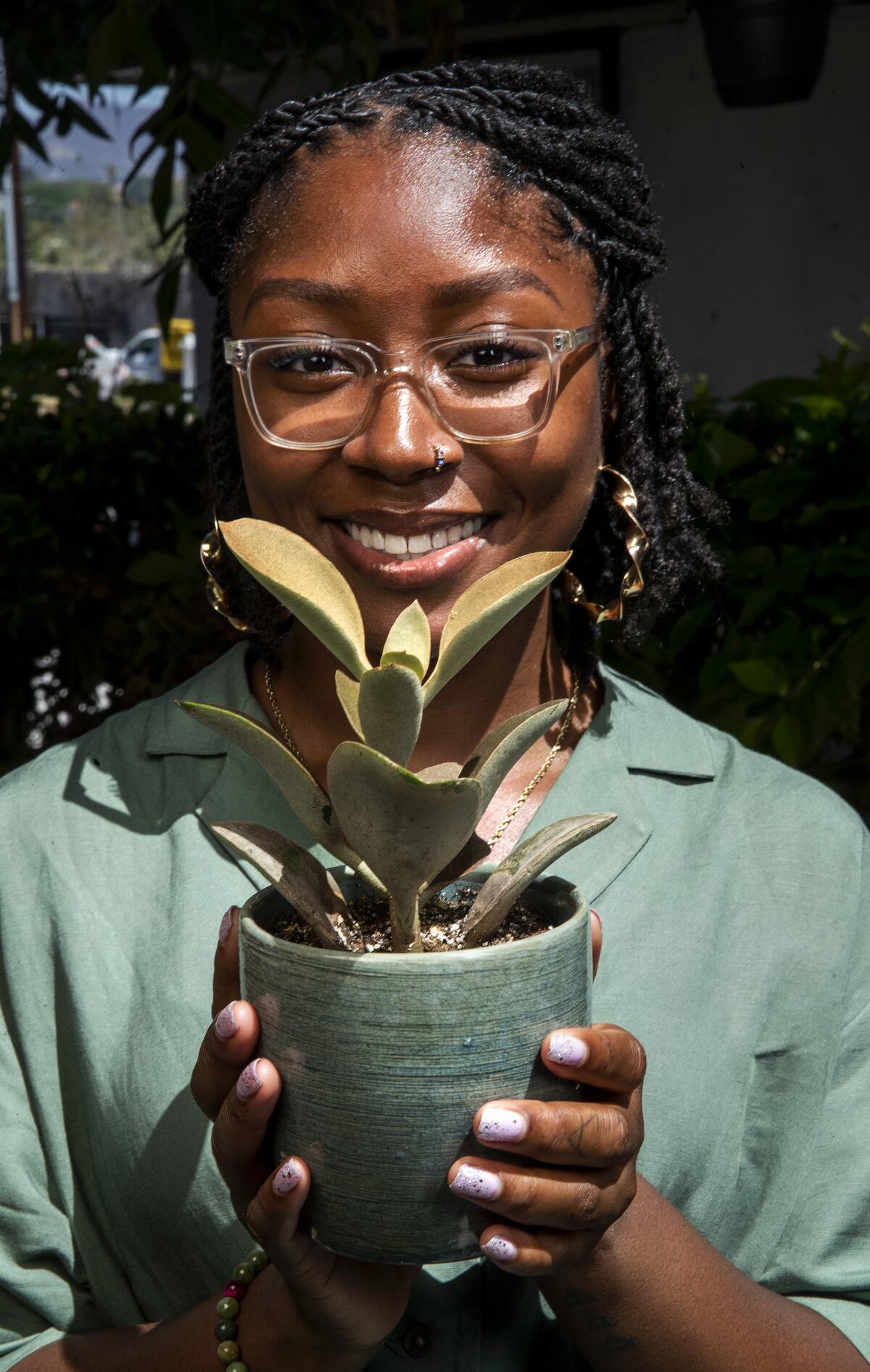
Recently, I interviewed Nicole and Hartfield about the creation of the Nice Plant amid the pandemic, their efforts to promote self-care to young people of color, and their goals and dreams for the future of the business.
This interview has been edited for length and clarity.
Tell me about the process of founding the Nice Plant.
Jasmine Nicole: We launched just over a year ago. We only took a few months in the development stage. Being producers and running our own creative agency, we were able to in-house develop everything from branding to the website to sourcing vendors to products and marketing.
The pandemic really slowed down all my other business activities and gave me time to do the developmental work for a brand new company. Once we decided that, of course, this thing should incorporate plants, we wanted to figure out “Why plants?”
There is this natural affinity I have for my plants and my self-care practices and the way that the two make so much sense together. We wanted to box that up and bring it to market. So we decided to tie that all in together and really amplify the message that everybody should have greenery in their spaces. It doesn’t matter what you look like; it doesn’t matter where you live.
People thrive in the presence of plants. So we wanted to amplify that message in a way that’s really Black people- and young people-centric because, a lot of times, that’s just not the picture you see as far as people with plants and mindful lifestyles go. We really want to be part of the transformation of that messaging because self-care and wellness journeys do not only look a certain way.
How does the Nice Plant incorporate representation into plants and self-care practices?
Taylor Hartfield: We are really intentional about how we market ourselves and who we’re involved with on social media. If you scroll through our page, there’s Black and brown [people] ... there’s everyone. We’re really focused on making sure we are choosing people that show that anyone can practice self-care. It’s about really being intentional about the faces we’re putting out into the world.
Why do you think it’s important to have representation in something like a plant shop?
TH: I think it’s important in this space but [also] in any space. For example, when “Black Panther” came out, everyone was seeing a Black superhero. For children, it was like, “That could be me.”
A list of our favorite Black plantfluencers, plant stylists, floral artists, enthusiasts, experts, and garden store owners on Instagram.
So for me, it’s for the next generation. For them to see that you don’t always have to be on the go all the time; you don’t always have to struggle. You don’t always have to be in a bad mental space and not focus on self-care. It’s important we show what self-care looks like and that it can include us as well.
JN: It also really affects us even as adults. Representation can revive a thing in you when you get a chance to be centered in messaging in spaces that have for so long felt like “It’s not made for me.”
Really seeing people thriving with their plants, creating their own forms of wellness and disregarding what the messaging has essentially taught us can transform your lifestyle.
What was it like starting a business during the pandemic?
JN: Really, launching the whole company was an unexpected blessing. On Jan. 1 last year, I was not about to start a brand new company. But being in the pandemic allowed me to change my perspective from like, “Oh, this would be the hardest thing ever,” to like, “How can we make this work? This is a perfect time [even though] there will be challenges.”
Sure, there were some unexpected challenges — supply chain issues, shipping hiccups, things that were happening due to a lack of essential workers — and that was obviously a bit tricky. But overall, having the opportunity to found this company in the middle of uncertainty and chaos has definitely been a blessing. It’s allowed us to get into rock star mode during the hardest time, so now as things make their way back to normal, it gives us an advantage because we were able to come out strong, and we can just keep soaring.
TH: The timing was perfect, in my eyes. Pinterest was saying that plant searches were up during the pandemic because people were at home. So as crazy as it sounds, it aligned at the right time.
You mentioned that you’ve hosted a few pop-up shop events. Can you tell me about those?
TH: We did our first one for Juneteenth, and it was amazing! It was not far from Elysian Park. We got to put faces to names. We even had some people like, “Oh, I found out about you through Instagram,” which was just amazing to see.
We are planning to have more at flea markets and things like that. We think we’re gonna do them monthly and see how it progresses. Maybe every weekend eventually. It’s been exciting to get out there into the community.
How do you incorporate self-care into your plants?
JN: I incorporate the practice of watering my plants to take a moment in my busy schedule to slow down for myself. It’s not a high-maintenance practice, paying attention to your plants. It allows me to notice little growth in the plants. I think they’re like a little mirror for me.
As entrepreneurs or creatives, you don’t really take inventory of your small wins. Like you’ve got to hit these crazy benchmarks or accomplishments to really be like, “Oh, yeah, I’m doing great.” But all the wins in between we kind of ignore or don’t even acknowledge. With plants, you’re seeing all this growth happen. You’re noticing all the little things, things in between. Noticing all those small interval moments of growth allows me to take inventory for myself and realize that all the little things are worth celebrating.
TH: It reminds me to give myself grace. You don’t have to be so hard on yourself all the time. It teaches you patience, that things take time to get to their fullest potential.
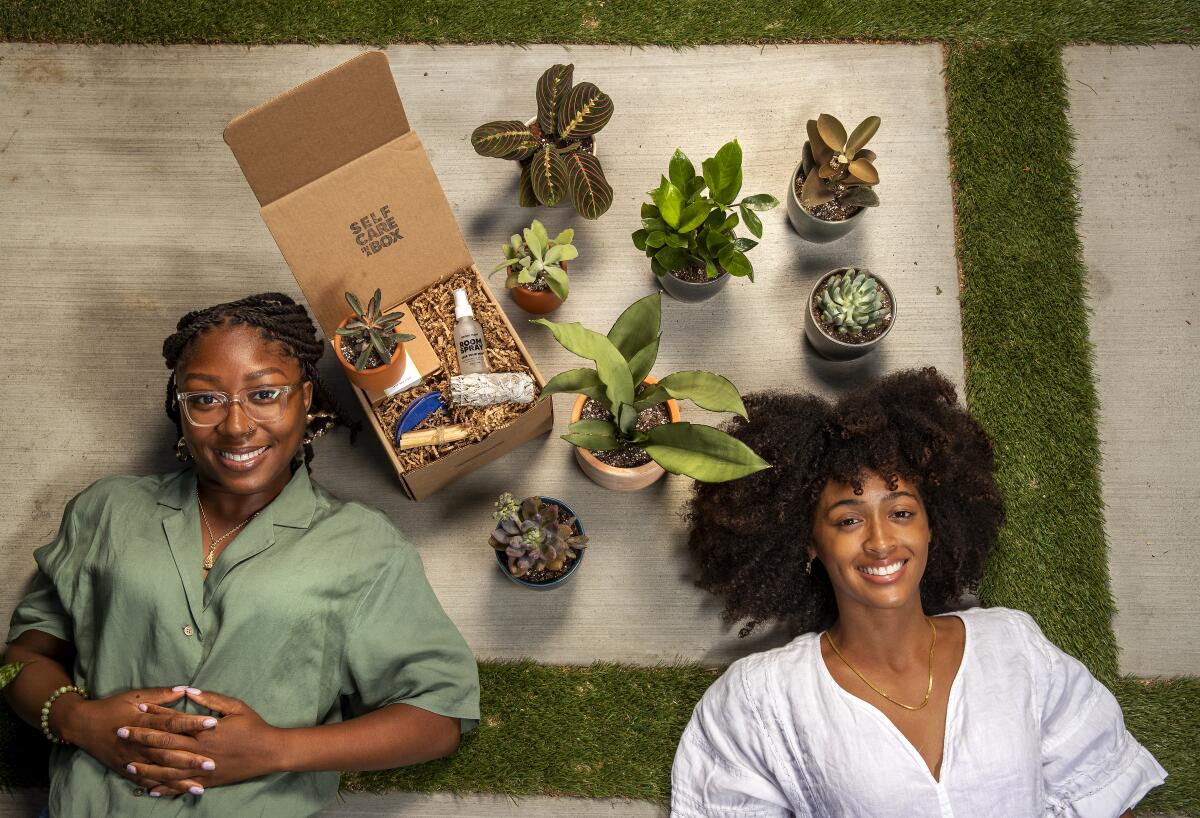
What goes into shipping a plant?
JN: We deliver everything straight to your door, hassle-free. Pop the box open, plants are ready to go. Right now, we work with local growers, and we’re expanding to doing some of our own growing, which is exciting.
Once we expand to brick and mortar, people will be able to pick up their plants. That’ll be a cool option, but right now, we handle the delivery. It’s really an easy process for people and makes it easy to gift as well.
The method in which we package our plants is super strong. We double-package the plant so that when you open the box, soil isn’t displaced and the plant is right-side up.
But plants really are much hardier than people would think, so [after] two, three days in a box, they’re OK. We care for them in our facility before their dispatch so they’re in optimal condition to start their trip and the transition doesn’t take a toll on the plant.
What plant species do you offer?
JN: Our bestsellers are small, potted succulents. We also have unpotted product offerings for people who want to get their hands a little bit dirty and do their own potting.
We also offer a larger-sized planter that includes a couple of different variations of plants. We also do a ficus and the baby fiddle-leaf fig. They’re medium in size and, of course, they grow!
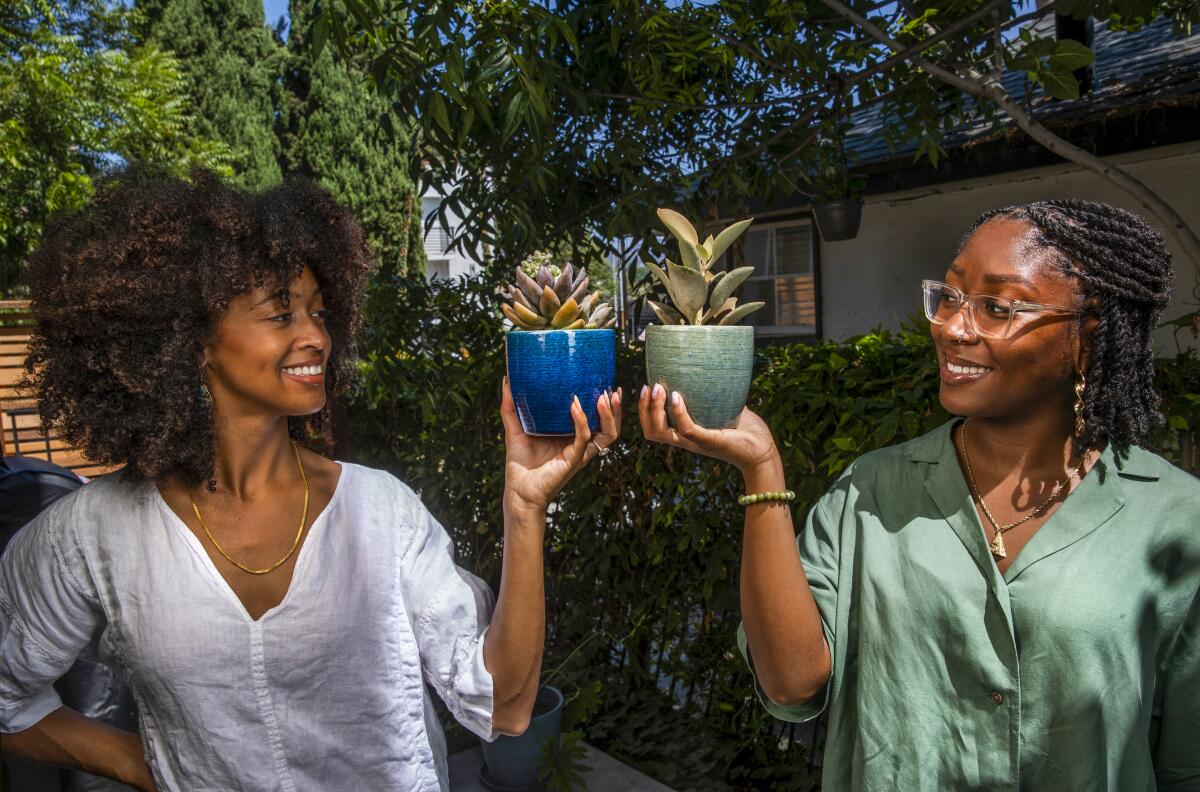
I noticed that the plants on your website have super cool names. How do you come up with those?
JN: We love that part of our branding. We’re really creative people, so it’s really natural for us. Some of our most popular ones are the “Better Than a Threesome,” which is a box with four plants. We’ve got our “Ready to Mingle,” which is our single plant offering. We’ve also got our two plants in a box, the “Make It a Double.”
It’s really just authentic to how we speak and the way we look at plants, no different from anything else in our lifestyle.
Tell me more about the Nice Plant’s unique branding.
JN: In terms of self-care, we spell it all out. We have cards that go in every single box that introduce people to creating their own little routine. For example, with our room spray, we encourage people to use it once a day, and when you’re using it to attach it to something positive, whether it’s a gentle reminder to yourself, meditating … use this product to help you incorporate whatever it is that could be a positive addition to your lifestyle consistently.
We’ve got our cool language and way we communicate these messages. I think language is everything. You can be trying to explain something, but if it sounds too foreign, you may not have effectively communicated what you’re trying to share or teach or encourage.
A lot of times, within wellness spaces and the way we see mindfulness, gratitude and self-care, the language is not always for us. The message isn’t intended for people who look like me or young people; it’s almost like a space of privilege where you have to fit a certain mold.
So I think for us that was really important — from the branding to the visuals to how we’re communicating different things, suggestions, encouragements — to just make sure it’s true to us. Everything that is on our bottles and our packaging is said very casually, and that’s very intentional. It’s on-brand for us as humans, and I think it’s been pretty successful.
What are the Self-Care Check-Ins you’re doing on Instagram?
TH: With Self-Care Check-Ins, we connect with other minority-owned businesses, creatives or anyone in the plant space and ask them a series of questions like you’re doing here. I’ll have a conversation about what their self-care practices look like because, like we said, we don’t want people to feel like their self-care has to look like one thing or fit in a box.
To celebrate Plant PPL’s first year, we asked 20 plant parents, gardeners and plant shop owners from our L.A. Times series for their best advice for growing happy, healthy plants.
What are your goals for the future of the Nice Plant?
JN: One of our biggest goals is to continue to grow relationships and create new relationships with our corporate partners. It’s really cool to work with companies that value thoughtful gifting for their teams and clients. We’ve had some really great experiences with some really big companies, and I want to definitely build out that side of our business because it’s really cool to hear feedback from recipients all over the country. And then, obviously, the brick-and-mortar is up there as one of our big goals.
TH: I want to be the go-to gifting company that everyone’s like, “Oh, yeah, if we need a thoughtful gift, if we want to send something sweet or small,” that’s us.
Finally, as we ask everyone in this series, what is your favorite plant?
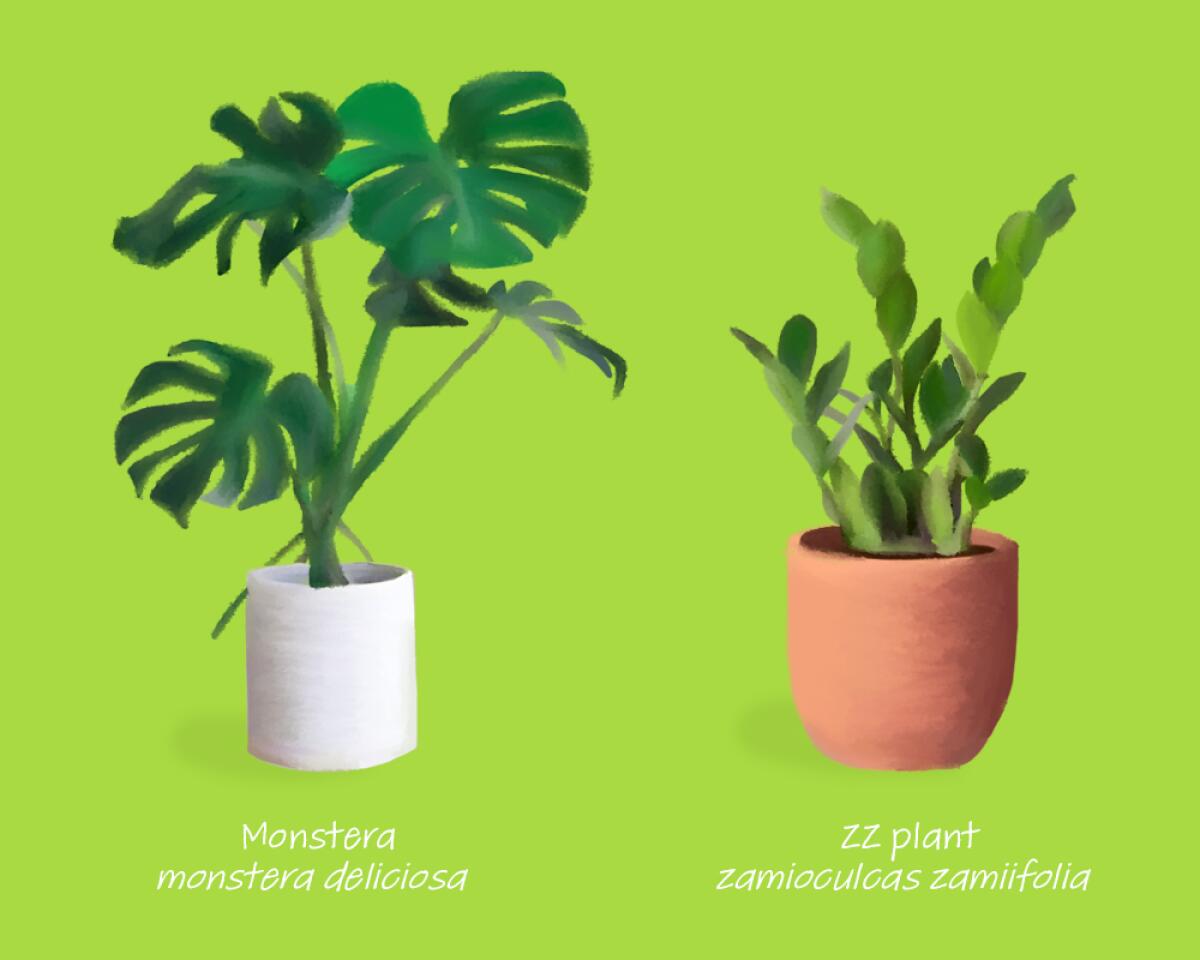
JN: My monstera is definitely top two. I have three of them, and it’s really cool to see its new growth.
TH: Mine is the ZZ plant. That was one of my first plants, and it’s easy to take care of in my space, so it just works out. I can still expect it to thrive, and it doesn’t need that much.
More to Read
Sign up for The Wild
We’ll help you find the best places to hike, bike and run, as well as the perfect silent spots for meditation and yoga.
You may occasionally receive promotional content from the Los Angeles Times.
